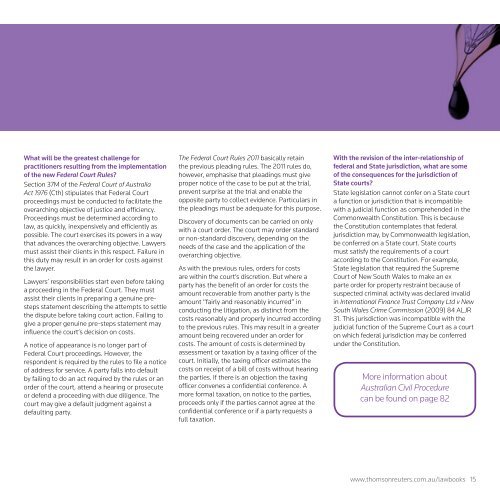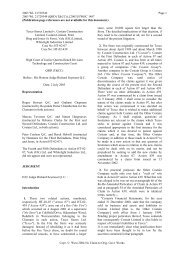DoWnloaD - Thomson Reuters
DoWnloaD - Thomson Reuters
DoWnloaD - Thomson Reuters
Create successful ePaper yourself
Turn your PDF publications into a flip-book with our unique Google optimized e-Paper software.
What will be the greatest challenge for<br />
practitioners resulting from the implementation<br />
of the new Federal Court Rules<br />
Section 37M of the Federal Court of Australia<br />
Act 1976 (Cth) stipulates that Federal Court<br />
proceedings must be conducted to facilitate the<br />
overarching objective of justice and efficiency.<br />
Proceedings must be determined according to<br />
law, as quickly, inexpensively and efficiently as<br />
possible. The court exercises its powers in a way<br />
that advances the overarching objective. Lawyers<br />
must assist their clients in this respect. Failure in<br />
this duty may result in an order for costs against<br />
the lawyer.<br />
Lawyers’ responsibilities start even before taking<br />
a proceeding in the Federal Court. They must<br />
assist their clients in preparing a genuine presteps<br />
statement describing the attempts to settle<br />
the dispute before taking court action. Failing to<br />
give a proper genuine pre-steps statement may<br />
influence the court’s decision on costs.<br />
A notice of appearance is no longer part of<br />
Federal Court proceedings. However, the<br />
respondent is required by the rules to file a notice<br />
of address for service. A party falls into default<br />
by failing to do an act required by the rules or an<br />
order of the court, attend a hearing or prosecute<br />
or defend a proceeding with due diligence. The<br />
court may give a default judgment against a<br />
defaulting party.<br />
The Federal Court Rules 2011 basically retain<br />
the previous pleading rules. The 2011 rules do,<br />
however, emphasise that pleadings must give<br />
proper notice of the case to be put at the trial,<br />
prevent surprise at the trial and enable the<br />
opposite party to collect evidence. Particulars in<br />
the pleadings must be adequate for this purpose.<br />
Discovery of documents can be carried on only<br />
with a court order. The court may order standard<br />
or non-standard discovery, depending on the<br />
needs of the case and the application of the<br />
overarching objective.<br />
As with the previous rules, orders for costs<br />
are within the court’s discretion. But where a<br />
party has the benefit of an order for costs the<br />
amount recoverable from another party is the<br />
amount “fairly and reasonably incurred” in<br />
conducting the litigation, as distinct from the<br />
costs reasonably and properly incurred according<br />
to the previous rules. This may result in a greater<br />
amount being recovered under an order for<br />
costs. The amount of costs is determined by<br />
assessment or taxation by a taxing officer of the<br />
court. Initially, the taxing officer estimates the<br />
costs on receipt of a bill of costs without hearing<br />
the parties. If there is an objection the taxing<br />
officer convenes a confidential conference. A<br />
more formal taxation, on notice to the parties,<br />
proceeds only if the parties cannot agree at the<br />
confidential conference or if a party requests a<br />
full taxation.<br />
With the revision of the inter-relationship of<br />
federal and State jurisdiction, what are some<br />
of the consequences for the jurisdiction of<br />
State courts<br />
State legislation cannot confer on a State court<br />
a function or jurisdiction that is incompatible<br />
with a judicial function as comprehended in the<br />
Commonwealth Constitution. This is because<br />
the Constitution contemplates that federal<br />
jurisdiction may, by Commonwealth legislation,<br />
be conferred on a State court. State courts<br />
must satisfy the requirements of a court<br />
according to the Constitution. For example,<br />
State legislation that required the Supreme<br />
Court of New South Wales to make an ex<br />
parte order for property restraint because of<br />
suspected criminal activity was declared invalid<br />
in International Finance Trust Company Ltd v New<br />
South Wales Crime Commission (2009) 84 ALJR<br />
31. This jurisdiction was incompatible with the<br />
judicial function of the Supreme Court as a court<br />
on which federal jurisdiction may be conferred<br />
under the Constitution.<br />
More information about<br />
Australian Civil Procedure<br />
can be found on page 82<br />
www.thomsonreuters.com.au/lawbooks 15

















